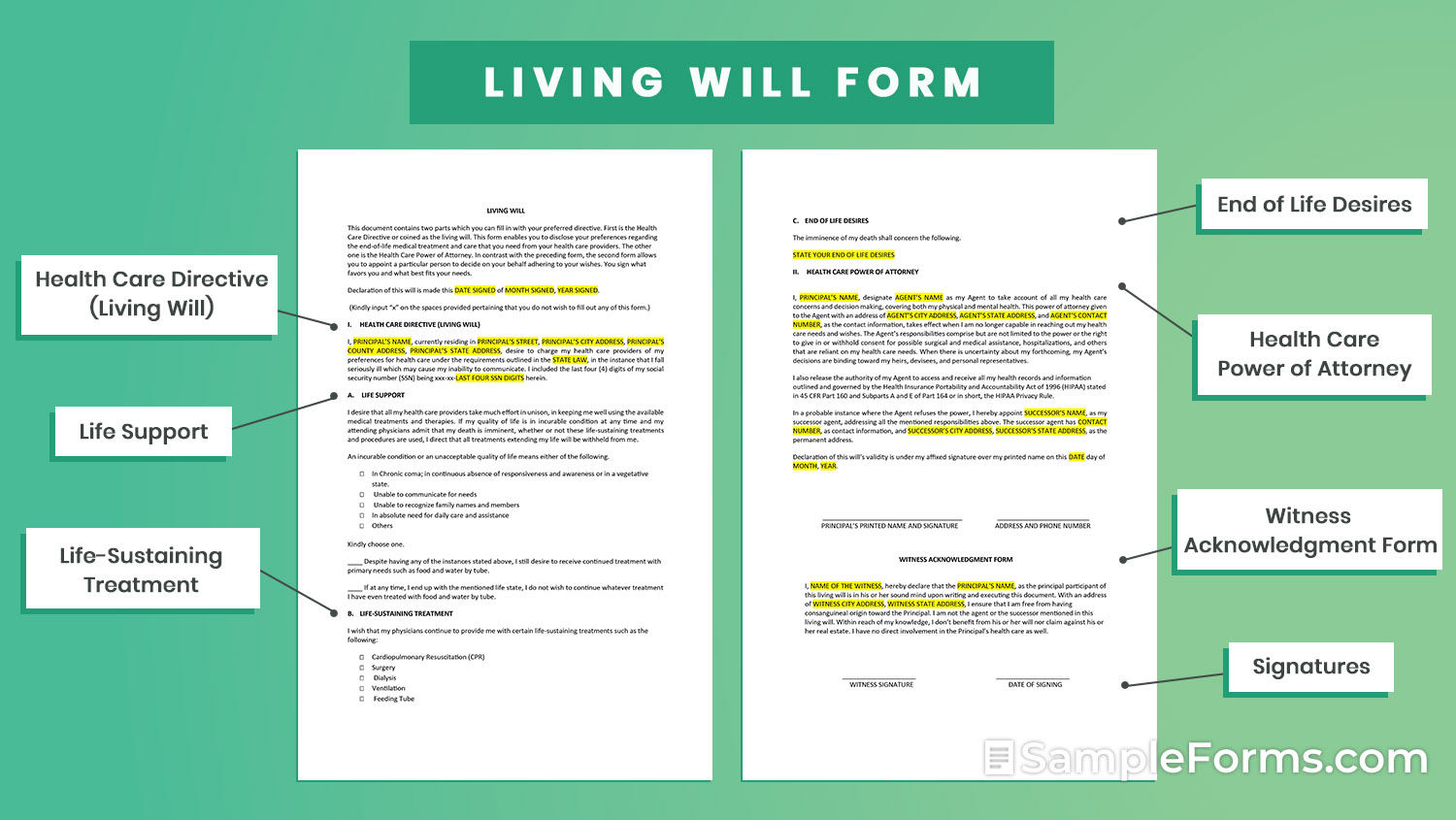- Eviction Notice Forms
- Power of Attorney Forms Forms
- Bill of Sale (Purchase Agreement) Forms
- Lease Agreement Forms
- Rental Application Forms
- Living Will Forms Forms
- Recommendation Letters Forms
- Resignation Letters Forms
- Release of Liability Agreement Forms
- Promissory Note Forms
- LLC Operating Agreement Forms
- Deed of Sale Forms
- Consent Form Forms
- Support Affidavit Forms
- Paternity Affidavit Forms
- Marital Affidavit Forms
- Financial Affidavit Forms
- Residential Affidavit Forms
- Affidavit of Identity Forms
- Affidavit of Title Forms
- Employment Affidavit Forms
- Affidavit of Loss Forms
- Gift Affidavit Forms
- Small Estate Affidavit Forms
- Service Affidavit Forms
- Heirship Affidavit Forms
- Survivorship Affidavit Forms
- Desistance Affidavit Forms
- Discrepancy Affidavit Forms
- Guardianship Affidavit Forms
- Undertaking Affidavit Forms
- General Affidavit Forms
- Affidavit of Death Forms
Living Will Forms
No one has a hold of what the future is. But someone can prepare for it, especially when it’s a matter of life and death and you don’t want to take your chances. That is why it’s only wise to prepare a document that can distinguish someone’s wishes about end-of-life medical care and treatment. And a Living Will can give you just that, plus the ability to sustain the perceived quality of life. It also serves as the go signal on how the principal would proceed after everything is fulfilled. If you want to know more about a last will and testament, living will, or any type of wills, their legality, and how you can create one, continue reading this article. Read More

Living Will Forms
What Is a Living Will?

A living will is a document that contains information on how the authorized medical staff decides for the principal’s welfare during times that he is dealing with a life-threatening situation. A principal is a person who prepares the living will. Health care advance directive is vital in keeping all important decisions at hand. Way back year 2010, apa.org has found out that 25% of Americans settled with having a living will. A few more jumps of years, an article from cnbc.com, have mentioned doctors are urging Americans to start crafting their living will due to the widespread of a life-threatening coronavirus. Since this virus spares no one, everyone must take action against this seriously.
How Do You Structure a Living Will?
Creating a living will do not need an attorney to fill out the details. Its fundamentals include the principal (patient) and a witness for the health care power of attorney. The requirements in presenting and making a living will depend on the state laws that you are currently engaging with. Some include notarization. Some do not. More importantly, creating a living will do not take you more than a day.
1. Check Your Individual Health Care Preference
Before you start lay-outing your living will, you need to check your treatment options. The thing about a living will is that you should be specific about what you desire for your health. For instance, you can specify a course of action on what treatment or kind of care you want when you are in a coma. Would you like the medical staff, to provide you with your primary needs, such as water and food by tube? Or would you prefer to stop such life support when you reach a particular stage? You must first review these considerations before making your living will.
2. Choose Your End of Life Wishes
Second, you mention your end of life desires. You will undergo a substituted argument. In this case, you assume that you are a dying person, what would your wishes be? You clearly define in your will what a good death is for you. Medical providers have to follow these desires at the right time.
3. Designate a Health Care Agent (Health Care Power of Attorney)
This part is not the same as the last two steps. This time, you designate a health care agent to decide for you in case you are incapable of reaching and responding to your health care needs and wishes. This agent instills the power to give in or withhold consent for surgeries or other needed treatment when deemed necessary. Otherwise, the principal may refuse using this portion when he already settled with the former.
4. Ensure Signatures On Your Form
Lastly, you have to make it signed. For the living will, you must affix your signature at the bottom of this document, ensuring the validity of the form. If you take a health care power of attorney, there should be witnesses who will sign it to make it valid in use. Notarization is optional.
FAQs
Why do I need a living will?
A living will is your health care directive toward your attending physician in case you’ll have difficulty in stating your needs. As a matter of fact, with this, you will get a firm hold on how you want your life to be during a situation when your life is truly at stake.
Do I need to notarize my living will?
It depends on the state where you belong. There are specific state laws that require you a notarization as an alternative for a witness. Or some necessitate this part together with the witness. However, there are also instances that the living will is off from notarization. Get to know your state laws governing it.
Who gets a copy of my living will?
Typically, the person you designate your living will with will get an original copy of your living will. This can either be your attending care physician or a specialist. Also, this can be your agent with your heirs to accompany.
People do not know what they are up to means to stay hopeful about whatever may happen along the way. This includes the preparation of the possible health care treatments and care that you need when you reach an incurable condition of your life. To ensure that everything is under your grip, you have to create a living will that states what you desire in your life during a stage where you fight for your life. It’s good to be hopeful, but it’s better when you take a step on how you want things to be.

